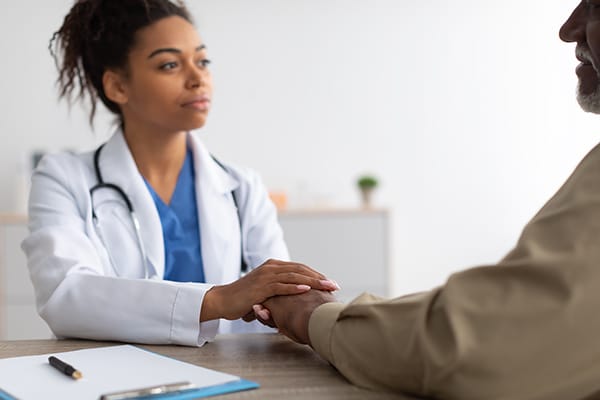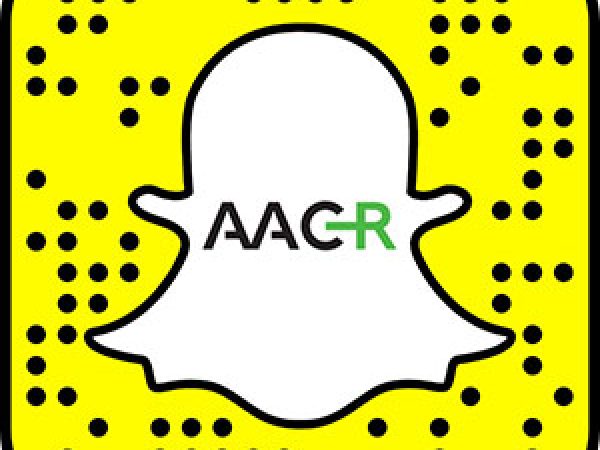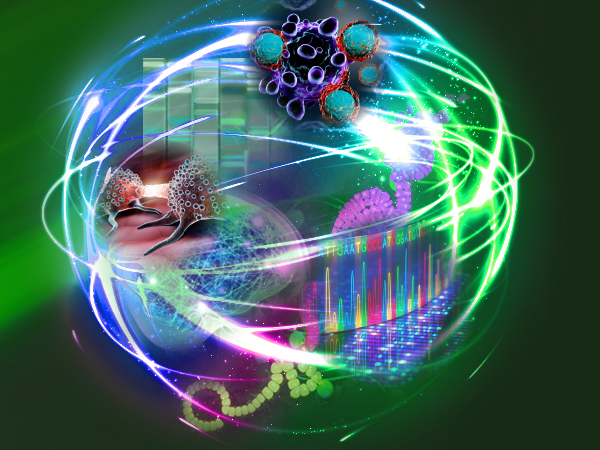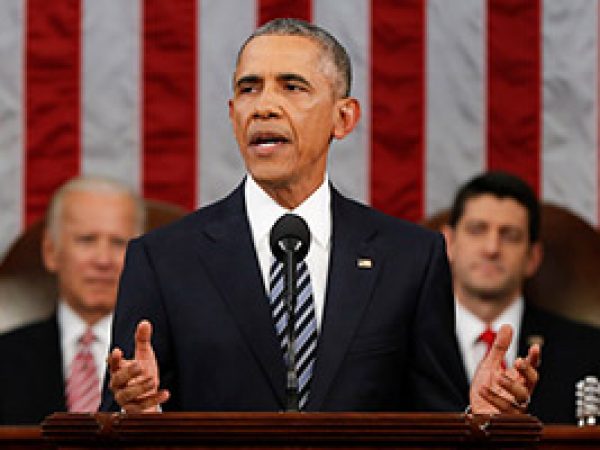Annual Meeting 2022: A New AACR Task Force to Promote Public Trust in Science
The COVID-19 pandemic has provided a strong reminder for the scientific community about the importance of public understanding and trust in the fruits of science. In response to this societal challenge, the American Association for Cancer Research (AACR), under the leadership of Immediate Past President David Tuveson, MD, PhD, FAACR, has formed the Trust in Science Task Force to catalyze efforts in creating a framework of shared values and developing policies and practices that promote trust in science and cultivate diversity to improve cancer research and care.
A forum during the AACR Annual Meeting 2022 was dedicated to addressing these efforts and featured a panel discussion with members of the Task Force, moderated by chair William S. Dalton, MD, PhD, founder and CEO of M2Gen, a biotechnology subsidiary of Moffitt Cancer Center.

Citing an article in Harvard Business Review, Dalton noted that social problems arise as a result of collective actions by all players involved, therefore their resolution requires the coordinated efforts of all those players, who need to work together to make a collective impact, guided by a system leadership that represents the different constituents.
In keeping with this vision, the AACR serves as the engine that will bring together stakeholders from various sectors—research institutions, patient advocates, providers, pharmaceutical companies, policymakers and regulatory bodies, and the National Cancer Institute (NCI)—to create a common agenda to build public trust in science.
“We are blessed to have the AACR, the most trusted and respected institution in the cancer research community, to serve as the primary mover that will be responsible for implementing these changes,” Dalton said.
The Task Force identified three main objectives that will form the core of the common agenda:
- improving communication
- improving health equality and equity to maximize patient benefit
- cultivating diversity as an ethos in the scientific enterprise
In the pursuit of these objectives, Dalton added, all stakeholders will have to learn from each other and respect each other’s perspective.
The goal is certainly critical and ambitious: “We must disrupt the current system and build a new system,” Dalton said. “It won’t be easy, and I believe this will be a perpetual effort and will need continuous diligence for us to truly succeed in building trust in science, but it will be worth it.”
Patricia A. Spears, a patient advocate at the University of North Carolina at Chapel Hill Lineberger Comprehensive Cancer Center, and a survivor of breast cancer and liver cancer, discussed some key aspects from the patient perspective.
Spears emphasized the importance of having all the stakeholders, with their different points of view on cancer research and care, represented in this effort. “We won’t have the same perspective, but what we can have is shared values,” she said.
She also noted how public trust in science is a two-way affair, in which the institutions that produce science have the responsibility to be trustworthy, and how trust is influenced by a number of factors, including social media, TV shows and news programs, doctors, scientists, and the personal experience of patients and their family and friends.
Communication is going to be the key to this project, Spears said. “Everybody knows that producing bad science for the sake of a good story is wrong, but we don’t think about the fact that producing good science but not communicating it with a good story is also failing to do what is right and necessary.”
If good science is not communicated, she argued, the public and political conversation will revolve around ideological arguments rather than facts and data.
One of the objectives of the Task Force is to improve communication, not just to the public but to all the stakeholders. “We need to come to the table with a common language,” Spears added.
Talking about science with non-experts is not an easy task and does not come naturally to all scientists, therefore Spears encouraged the researchers in the audience to learn, practice, and train early-career researchers in communicating effectively with patients and the community, and said this education should be further integrated in the curricula.
“The reason why you need to do this is because the public is not hearing the truth in science as much as they are hearing pseudoscience, misleading headlines, misinformation/disinformation, anecdotes, and a lot of hype,” she said.
Jesse Nodora, DrPH, associate professor at the Moores Cancer Center, University of California, San Diego and director of community engagement at the Altman Clinical and Translational Research Institute, noted that to reach its goals, the Task Force will have to create a dialogue with the community. He also talked about the importance of taking an asset-based—instead of a deficit-based—approach, to identify and affirm the role of untapped potential in making positive change, rather than focusing too much on problems and weaknesses.
Nodora recognized the role played by Ned E. Sharpless, PhD, FAACR, former director of the NCI, in championing diversity and equity and helping set the stage for the type of changes the Task Force is planning to implement.
In the panel discussion that followed, John D. Carpten, PhD, FAACR, chair of translational genomics and director of the Institute of Translational Genomics at the University of Southern California Keck School of Medicine, and a member of the AACR Board of Directors, made some powerful points. “We are all just afraid to do what is really required to solve this problem on so many different levels,” he said. “We have to get beyond the fear of working together.
“We have started to see barriers breaking down, but a number of other barriers are still in place,” Carpten said. “Everyone’s voice is important, and everyone has to have equal weight at the table, but we are just not there yet.” Spears suggested that compared with older colleagues, the new generation of researchers are not as afraid and stuck in the old ways, and they might be the ones who break down silos.
According to Cimona V. Hinton, PhD, professor at Clark Atlanta University, distrust is largely due to past abuses, and improving trust in science requires undoing years of socioeconomic and political exploitation and changing a mindset that has been in the making for a long time. “We need to develop a collective sense of purpose,” she said, emphasizing that the cancer research and care community should appreciate the groups it is trying to serve and advocate for what matters for patients.
James W. Lillard, PhD, MBA, senior associate dean of Research, Innovation and Commercialization at Morehouse School of Medicine, pointed out the lack of diversity in many disciplines that drive precision medicine. To close this gap and improve diversity in the cancer workforce, we need to train a more diverse student body, he said.
Stacey J. Adam, PhD, associate vice president of the Foundation for the National Institutes of Health (NIH), said that, in its purpose to help the NIH conduct public-private partnerships, the Foundation works on multiple projects engaging with different communities and has been applying some of the principles and objectives of the Task Force in its own microcosm.
Speaking from the industry perspective, Eric H. Rubin, MD, vice president of clinical oncology at Merck Research Laboratories, said that, conducting research globally in very diverse populations, pharmaceutical companies have been working to engage the communities, raise awareness, and build diversity—for example, identifying sites with large representation of minority groups. According to Rubin, success for the Task Force will mean that there will be no more barriers to the inclusion of all patients in clinical trials and clinical care.
Tracy G. Lively, PhD, chief of the Diagnostics Evaluation Branch of the NCI’s Cancer Diagnosis Program, said that the NCI has been tracking the demographics of participants in clinical studies, and that gives a sense of where we are and how much further we need to go.
She explained that the NCI is taking new approaches toward community engagement. She mentioned as an example the Participant Engagement and Cancer Genome Sequencing (PE-CGS) Network, which falls under a scientific priority indicated by the Cancer Moonshot initiative. Some of the research projects funded through this network, she said, build on many years of dialogue with understudied and underrepresented communities, and emphasize mutual learning. “This project will fill some key diversity gaps and provide models for how to do this better in the future,” Lively said.
As Nodora highlighted, different levels of awareness of scientific and health literacy exist, but low scientific education should not be a barrier to establishing an effective dialogue. He noted that some people with low education levels can grapple with very complex information, if it is presented appropriately.
Nodora argued that stereotypical assumptions are often made about some communities and the way they consider science, but approaching them with respect and openness, and being willing to listen and offer something rather than only take something from them can go a long way in gaining their trust.
“All this is not going to happen fast; there are so many layers that have to be peeled back,” Carpten said. “But I am optimistic that over the course of the next five to 10 years we will begin to see change.”



